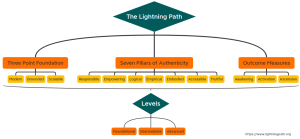The Lightning Path: Difference between revisions
An Avatar.Global Resource
Pathfinder (talk | contribs) No edit summary |
No edit summary |
||
| Line 2: | Line 2: | ||
<h1 class="customtitle">{{FULLPAGENAME}}</h1> | <h1 class="customtitle">{{FULLPAGENAME}}</h1> | ||
<blockquote class="definition"> | <blockquote class="definition"> | ||
The [https://www.lightningpath.org Lightning Path] is a sophisticated and modern [[Human Development Framework]]. The Lightning Path sees pure and persistent [[Connection]] as the primary endpoint of human evolution and development and, because of [[Toxic Socialization]], [[Healing]] as a necessary step towards [[Connection|reConnection]]. | The [https://www.lightningpath.org Lightning Path] is a sophisticated and modern [[Human Development Framework]]. The Lightning Path sees pure and persistent [[Connection]] as the primary endpoint of human evolution and development and, because of [[Toxic Socialization]], [[Healing]] as a necessary step towards [[Connection|reConnection]]. | ||
</blockquote> | </blockquote> | ||
Revision as of 14:26, 18 September 2024
The Lightning Path
The Lightning Path is a sophisticated and modern Human Development Framework. The Lightning Path sees pure and persistent Connection as the primary endpoint of human evolution and development and, because of Toxic Socialization, Healing as a necessary step towards reConnection.
Elements of The Lightning Path
The Lightning Path > LP Research Program, LP Socials, LP Techniques and Practices
LP Workbooks
Lightning Path Workbook One, Lightning Path Workbook Three, Lightning Path Workbook Two, Ligtning Path Workbook Four
Related LP Terms
Lightning Path > Hard Path, Human Flourishing, LP Connection Framework, LP Creative Framework, LP HEALING Framework, LP Social Media Channels, Lightning Path Core, Lightning Path Curriculum, Lightning Strike, Nomenclature Confusion, Psycho-Social-Spiritual Education
Non-LP Related Terms
Notes

- The Lightning Path is a pedagogical experiment, a response to a call to action to create authentically transformative academic level content[1] but delivered in a grounded and accessible package.
- The LP is a response to Maslow's call for "mass techniques" of helping. Noting that most people can't avail themselves of expensive psychoanalysis, Abraham Maslow suggested that "...we must turn our attention more and more to mass techniques of helping the person to discover this precious human nature deep within himself-this, nature that he is afraid of expressing."[2] The Lightning Path is designed to be such a "mass technique."
- The LP is a response to the call for "technology" to facilitate a "Consciousness Revolution"[3].
- The LP is a "Radical intervention" designed to "accelerate a rapid social transformation to avoid the dire outcomes currently forecast"[4] The LP provides a "paradigm shift,"[5] not just towards climate justice as an organizing paradigm but to one that fundamentally shifts our ideas about human potential, human spirituality, and what it means to be human.
- The Lightning Path is a sociological excuses into religion and human spirituality. It is an attempt to bring a much needed sociological sophistication to religion and human spirituality. As Samuel Perry notes
There are few research areas for which there is a greater disconnect between the contemporary relevance of that topic and its position within the academy than religion. To be sure, this problem is broader than sociology. Political scientists, economists, and psychologists all recognize that religion research is marginalized within their own disciplines (Fox 2021; Grzymala-Busse 2012; Iyer 2016; Kettell 2012, 2023; Philpott 2009; Rios and Roth 2020; Wald and Wilcox 2006). But even if this pattern is commonplace, it is still a problem. Religion does not go away when social scientists ignore it. Instead, the people we’d rather not inform the public about religion—including politicians, pundits, and grifters—gladly fill the gap to tell their audiences everything they need to know (Perry 2023a, 2024). Sociologists aren’t just missing our chance. We’re abdicating our responsibility to shape how society understands one of its most pervasive and powerful forms of social behavior. And it’s our fault.[6]
- Recent shifts in scientific attitudes emphasize the importance of studying human spirituality and religion. Researchers now recognize that understanding these aspects is crucial for a comprehensive view of human behavior and brain function. This aligns with the Lightning Path's ongoing research, which integrates scientific inquiry with spiritual practices to foster holistic understanding and personal transformation [7]
- The goal of the LP is global transformation.
- Lightning Path curriculum is focused on Healing trauma and preparing the Bodily Ego so that it can achieve strong and permanent Connection with its own Spiritual Ego.
- The LP currently consists of a carefully knit collection of (planned) courses, workbooks, Rocket Guides, scholarly articles, a patreon where you can show your support for the LP, and this SpiritWiki.
- The LP is still in development.
Related LP Content and Courses
Citation and Legal
Treat the SpiritWiki as an open-access online monograph or structured textbook. You may freely use information in the SpiritWiki; however, attribution, citation, and/or direct linking are ethically required.
Footnotes
- ↑ Thierry, Aaron, Laura Horn, Pauline von Hellermann and Charlie J. Gardner. “‘No Research on a Dead Planet’: Preserving the Socio-Ecological Conditions for Academia.” Frontiers in Education 8 (2023). https://www.frontiersin.org/articles/10.3389/feduc.2023.1237076.
- ↑ Maslow, Abraham. “Eupsychia—The Good Society.” Journal of Humanistic Psychology 1, no. 2 (1961): p. 7.
- ↑ Laszlo, Ervin, Stanislav Grof, and Peter Russell. The Consciousness Revolution. Las Vegas: Elf Rock Productions, 1999
- ↑ Thierry, Aaron, Laura Horn, Pauline von Hellermann, and Charlie J. Gardner. “‘No Research on a Dead Planet’: Preserving the Socio-Ecological Conditions for Academia.” Frontiers in Education 8 (2023). https://www.frontiersin.org/articles/10.3389/feduc.2023.1237076 para. 23.
- ↑ Kinol, Alaina, Elijah Miller, Hannah Axtell, Ilana Hirschfeld, Sophie Leggett, Yutong Si, and Jennie C. Stephens. “Climate Justice in Higher Education: A Proposed Paradigm Shift towards a Transformative Role for Colleges and Universities.” Climatic Change 176, no. 2 (February 9, 2023): 15. https://doi.org/10.1007/s10584-023-03486-4.
- ↑ Perry, “Religion Matters (And Doesn’t Go Away When Sociologists Ignore It).,” Sociological Forum 38, no. 4 (December 2023): 1456–63. p. 1456
- ↑ Patrick McNamara et al., “Neuroscientists Must Not Be Afraid to Study Religion.,” Nature 631, no. 8019 (July 2024): 25–27, doi:10.1038/d41586-024-02153-7/
